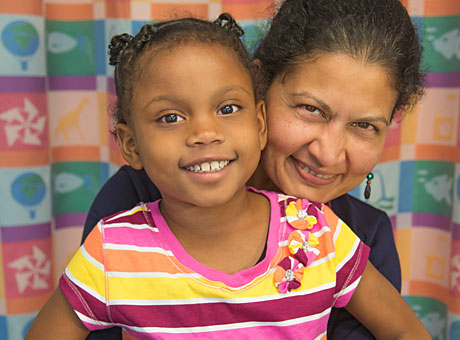
Shalini Shenoy, MBBS, MD, gives Gabby the OK to stop taking protective post-transplant medications — and jump into a life without sickle cells.

Shalini Shenoy, MBBS, MD, gives Gabby the OK to stop taking protective post-transplant medications — and jump into a life without sickle cells.
Despite the severity of sickle cell disease, Shalini Shenoy, MBBS, MD, the Teresa J. Vietti, MD Scholar in Pediatrics, now achieves successful donor cell engraftment using both unrelated donor bone marrow and cord blood products.
That the reduced-intensity unrelated cord blood transplants succeed is a tribute to Shenoy’s tenacity. The wider medical community largely abandoned reduced-intensity cord blood transplants following early failures, reverting to myeloablative conditioning with siblings only.
Just eight years earlier, myeloablative conditioning in bone marrow transplants from unrelated donors also was considered too toxic for patients. But Shenoy devised a reduced-intensity transplant approach. Based on her experience, the first unrelated donor bone marrow transplant trial for sickle cell disease was opened through the National Heart, Lung and Blood Institute’s Bone Marrow Transplant Clinical Trials Network. Shenoy is principal investigator for this trial.
Reduced-intensity unrelated transplants for sickle cell began succeeding with bone marrow, but initially failed with umbilical cord blood. Shenoy persevered, further fine-tuning the pharmaceutical cocktail and tweaking the protocol until unrelated cord blood transplants also began working.
John F. DiPersio MD, PhD, chief of the Division of Oncology and deputy director of the Siteman Cancer Center, hails Shenoy’s work. “Her clinical studies will have a transformative impact on the future success of both related and unrelated stem cell transplant for children with sickle cell anemia, resulting in restoration of normal blood production while minimizing the usual toxicities of unrelated stem cell transplants.” Shenoy directs the Pediatric Bone Marrow Transplant Program at St. Louis Children's Hospital and the Alvin J. Siteman Cancer Center at Barnes-Jewish Hospital and Washington University School of Medicine.
Shenoy’s reduced-intensity approach since has been applied in bone marrow transplants for another condition, thalassemia, in a national trial, which used the modifed approach successfully and included unrelated cord blood transplants. Shenoy and others now are testing similar methods to treat several non-cancerous immune and marrow failure disorders.